Flowers in the Desert, Syria
 Tuesday, August 26, 2008 at 07:41PM
Tuesday, August 26, 2008 at 07:41PM My other favourite country is Syria. I have raved about it from time to time and struggle with the bad press it seems to have through the western world. It is safe, friendly, easy to travel in, and comparatively cheap.
Bob also worked in Syria while we lived in Egypt and I went often, with friends, and just because I wanted to show it to people I know would love it.
On a drive from Aleppo to Palmyra we had a police escort - no, not because it is dangerous but because they chose to honour my husband.
At one point in a long stretch of gravelly and not-very-interesting desert we flashed past a patch of pure gold on the side of the road. I was up and twisting in my seat to try to see what it was.
"Stop!"
"Jen, we can't just stop - we have a chase car on our tail!" He was right - any attempt to pull up in a hurry would probably have embedded the following police car well into the rear of ours.
By the time we got to this point what I had seen was miles away behind us and I was not even sure I would find it again.
"It was bright yellow and I think it was a flower."
Now all of us started to search. Bob was keen to try to find it for me and reassuring. "If there was one there will be more!"
Well, if there were more they were keeping out of sight.
We arrived in Palmyra and forgot all about it. No sign of flowers of the sort I had seen, but Palmyra is so beautiful that it really didn't matter. It was freezing. Syria gets frequent snow and while that was unlikely this far out it had been known to happen. There are hills around the city, but it is an oasis in a slight depression, and the hills simply seemed to serve as wind tunnels. The sky was silver grey, the gravel and earth pale copper, and the ruins a shade or two darker - all a mid-tone landscape.
Syria has a huge advantage for the tourist over Rome and other countries that have Roman Cities. They do not lock them up. You can walk the city at one in the morning if you choose. I took my last textile tour our for a drink in the ruins in the moonlight. There was something completely magical about sitting in the moonshadow of a temple, with a bottle of Baileys on a broken column and the moon rising over the Citadel above the city. I had tried for champagne, but duty free did not stock it!
I just cheated and used the top two photos from a different visit - sometimes I just looked and did not actually photograph - I have so many shots and somehow icy cold days with flat light are not inviting. I would have to remove my gloves to use my SLR and it was about 4 degrees with a huge wind-chill factor. The following shots were taken on the day I am talking about!
We left Palmyra around eleven am (we had stayed the night and prowled in the morning). At the halfway point on the road from Palmyra to Damascus there are a series of coffee shops. They are charming - stone built, with accompanying beehive houses for the owners. They were built by two cousins, and the best are Baghdad Cafe 66 and Baghdad Cafe 55. Did I mention the same Highway goes from Damascus to Baghdad?
This is Baghdad Cafe 66. Not the cafe itself, but the houses nearby.
Now the country of Syria is divided on which of these two cafes is better. We have always stopped at Baghdad Cafe 66 and I really like the men who run it. It probably does not hurt that both are very good looking, and that they frequently sit and play the Rebaba - a strangely tuneless drone instrument made of almost anything that can provide an echo box and a shaft to hold a couple of strings. It is definitely done to work the picturesque.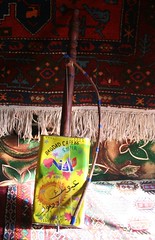
Imagine a stone building with rough plastered white walls. Inside it is gloomy and benches surround the small room. There is a counter with fossils they have picked up in the desert, flints, odd and interesting rocks and crystals, and a board of cheap bright jewellery. The air smells of coffee and the sugary smell of Arab tea - and Kerosene - especially in winter as a kerosene heater sits beside the bench. An arm sticks out of it and a drip forms there every second, then falls through the air to disappear into the innards of the heater to warm the room very effectively. It radiates shimmering heat and people tend to huddle near the heater to drink their tea.
The benches around the walls are covered with rough sheepskins, white patched with sand and chocolate colours in the way of local sheep. There are more skins on the walls as one way these men earn some extra money is by making maps of Syria on the leather side of home-tanned sheepskins. There are only two small windows and they are thickly glassed with somewhat dusty glass. It does not let in a lot of light, but enough of a beam that falls beautifully - to caress the side of the players dark face, shadowed in his red and white kaffieh, then slant across the slim dark hands that caress the rebaba.
We have, over the years, got to know the brothers who live and work here. I truly admire the fact that someone had the wisdom not just to make a small hut that can serve tea to tourists, but to make it charming, and to eak out a living with gleanings from the nearby fossil-loaded hills. I have rarely seen anyone one enter without buying - and their prices are low and enticing. They have personal charm too. We once arrived, all had tea, and chatted, and used their toilets - and left. We were almost forty kilometres away before we realised we had not paid for the tea. We phoned to apologise and they were delightful, and said we were very welcome as their guests any time. On a subsequent visit we paid - more than double, and arrived with a box of sweets as a 'sorry' present. Other drivers with tourist buses arrive with supplies for them - bread and sugar and tea - as they are two hours from the nearest shop. We have fallen into the same habit - making sure we pick up a gift of fruit or biscuits before we leave Damascus or Palmyra.
The other thing they have done is to set up three toilets behind their cafe. These are squat toilets, but they have a plentiful water supply and are always spotlessly clean. This is truly a formula to ensure success in the world of Syrian tourism.
I walked out the back to the use their facilities and saw something I have only seen once before in the Middle East.
They tie the sheep in a long double line, looping the same length of rope around one neck, then another, and alternating directions of head to tail! It makes interesting photography.
We left, and I was very tickled about the milking! I had once, In Ramallah in Palestine, made the mistake of confessing that while Australia does have countless millions of sheep, we rarely milk them. "Why not?" demanded the very authoritative lady in charge of my hostel. "I muttered a tame "they would not like it and they are wild". Australian sheep tend to see a farmer to lose their tails and sometimes testicles, to be drenched and dipped, and to be shorn once a year. All are unpleasant. The last time they see a farmer is the most unpleasant of all as we usually breed for meat.
"You must train them" she said. I pointed out that a farmer might have three thousand sheep and she was appalled at the waste of all that milk - in fact she immediately told me what the yield would be if half the flock could be assumed to be female. "You must take some bedouin from here - they will train them for you," she said.
In the midst of the sort of smugness that comes from seeing something you have been looking for for a long time, there was another fast flash of gold beside the road. Bob saw it first and was so pleased to have found it for me. We had left the chase car in Palmyra - and gleefully reversed to see what it was.
In the sparse and unfriendly gravel, pushing aside great chunks of concrete-like clay, were spears of pure gold. No leaves, just flowers, and incredibly beautiful. In an area of almost zero rainfall who knows how long their roots must lie dormant.

There were two small clusters - some just emerging, other well into full flower.
It was a stunning end to a day.

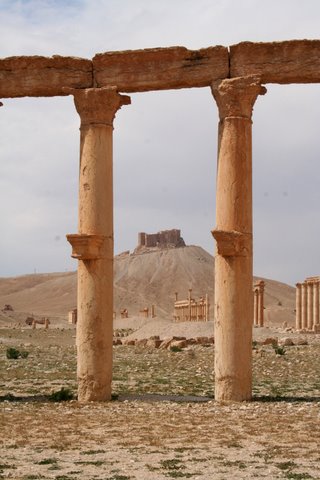
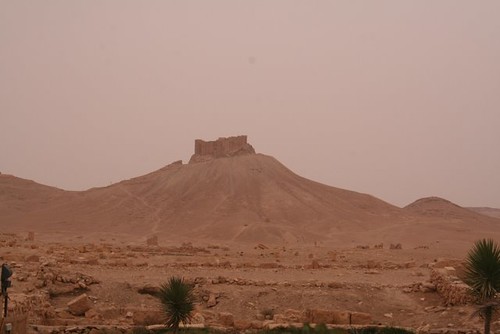
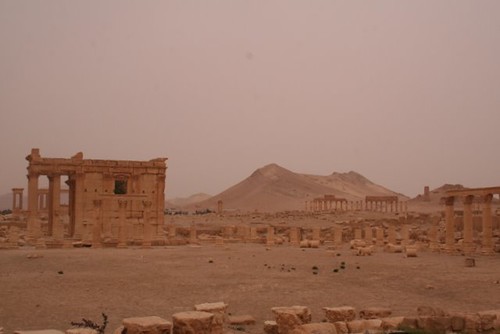
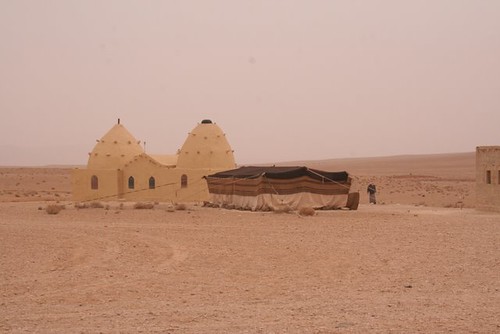
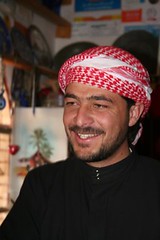
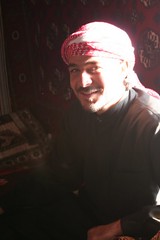
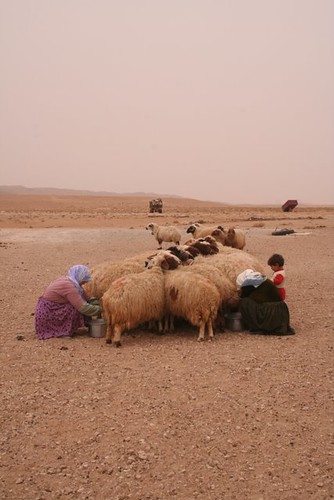
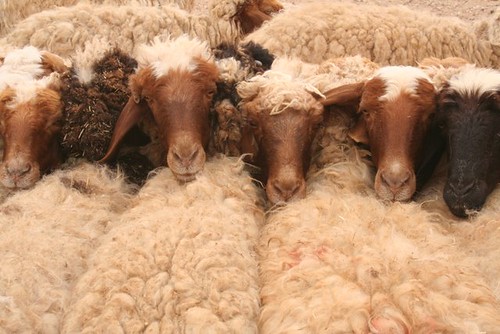
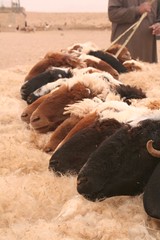
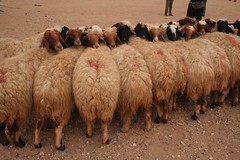
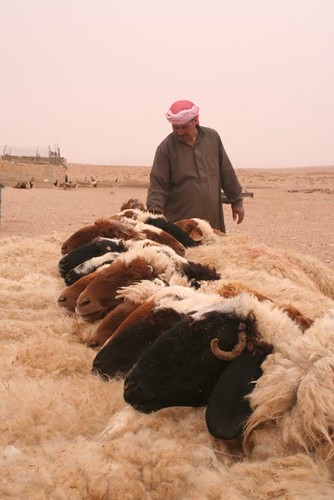
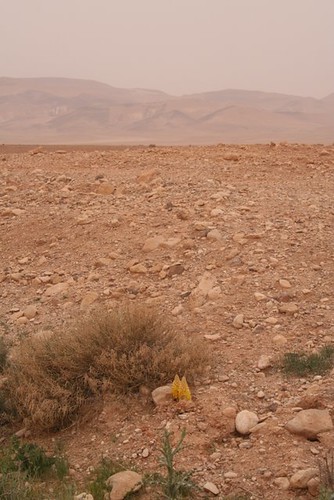
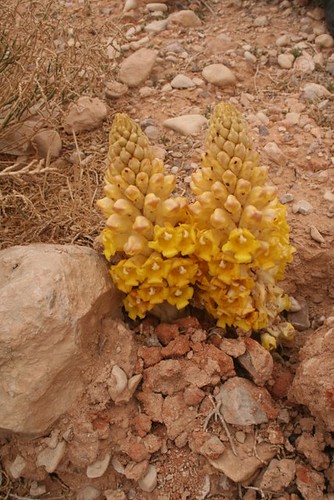

Reader Comments (8)
Thank you for keeping up with the middle east posts - your photos are amazing as well as your writing. Have you considered writing a book? People here in the US tend be surprised when I tell them how safe and hospitable it is to travel in the Islamic world, your stories and photos really get that point across.
So glad you are still sharing all of these wonders with us.....
fabulous photos and great stories
Thanks!
What a wonderful story, Jenny. The magic of finding those flowers int eh desert must have been darn near miraculous. And the sheep!!! I find the frugality of the peoples you have experienced, the sheer resourcefulness amazing. It must be very difficult to have shared so much of your soul with a place and people for so long then to find yourself in "civilized" circumstances, and feeling so alien. My sister shows the same thing every time I talk to her or see her, having been in Lebanon and Dubai so long. It has become so much a part of her that the person she was is so changed....
Many hugs, my friend.
Rain
This is a wonderful blog with interesting pictures and stories. Thank you
Greatings from Germany
Manuela
Jenny, so pleased to have "popped into your blog" and to see you are back. I have loved reading about your life in the Middle East and sometimes you have drawn me in with your writings that I felt I am actually there with you and it's been a shock to come back to reality. Please continue with your memories and photos - wonderful stuff.
Best wishes,
Lindsay in Switzerland
I'm so pleased you are still posting these beautiful photos and telling us about the stories behind them......I have only been on holiday to Eygpt but loved the country and it's people.....Hope you have settled back in Australia ok.....Hugs Chrissy x
Salam.
Thanks a lot for letting us know about this beautiful country.Your blog contains great pictures that show the beauty of this marvelous place.
Martha